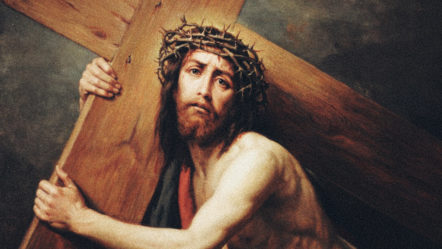“You shall not carve idols for yourselves in the shape of anything in the sky above or on the earth below or in the waters beneath the earth.” (Exodus 20:4)
It should be obvious to us believers that no human being can adequately create an image of God. God’s full revelation of himself was recorded by John in his first letter.
Whoever is without love does not know God, for God is love. (1 John 4:8)
We have come to know and to believe in the love God has for us. God is love, and whoever remains in love remains in God and God in him. (1 John 4:16)
However, this was possible and understandable only after Jesus died on the cross and, in his resurrection, won his victory over all evils, death included. The Ten Commandments are God’s first attempt at directing his people toward an “acceptable” image of himself as the most loving Lawgiver offering his chosen people a very reliable path to life and prosperity. The Ten Commandments are, indeed, all about love: love of God and love of our neighbor. However, the history of salvation gives painful, repeated, ample evidence that God’s love and predilection for his people remained largely unappreciated and unreciprocated because his law had not yet been interiorized. Thus, through the prophets of old, the Lord God set out to write his law in the hearts of his people.
But this is the covenant which I will make with the house of Israel after those days, says the LORD. I will place my law within them and write it upon their hearts; I will be their God, and they shall be my people. (Jeremiah 31:33)
Again, the history of salvation indicates that, besides the prophets, few other people responded to God’s love and predilection by being guided and motivated by his law written in their hearts.
The Old Testament refers to these people driven by inner motivation as “a remnant.” For out of Jerusalem shall come a remnant, and from Mount Zion, survivors. The zeal of the LORD of hosts shall do this. (Isaiah 37:32)
However, historically, even the chosen people included in this mysterious “remnant” could not respond fully to God’s love. Hence, the term “remnant” remained as more indicative of God’s burning zeal and unfailing promise of his boundless love and fidelity to the covenant than as indicative of a people eager to respond to him with love and fidelity of their own. Undoubtedly, there was urgent need for God to offer the most accurate image of himself in a way so unmistakably clear that a “new remnant” would learn that he is Love.
Jesus said to him, “Have I been with you for so long a time, and you still do not know me, Philip? Whoever has seen me has seen the Father. How can you say, ‘Show us the Father’? (John 14:9)
Thus, in the fulness of time, God the Son became flesh and walked the streets of Palestine revealing the most accurate image of the Father. He also taught the new remnant that they were destined to inherit a Kingdom completely built on love: Do not be afraid any longer, little flock, for your Father is pleased to give you the kingdom. (Luke 12:32)
My fellow members of the new remnant, Jesus’ little flock, where is this Kingdom in which the infinite love of the Father is reciprocated generously and enthusiastically by those who are driven by the law of love written in their hearts? If we reflect on the horrific level of hatred, indifference and selfishness still present in this world, we realize that something very daring is required of us for Jesus’ Kingdom of love to become more visible.
We should interpret clearly Jesus’ burning zeal for his Father’s House: by his furious and prophetic action described by today’s gospel (John 2:13-25), he was laying bare the superficial love of those who sacrificed oxen, sheep, and doves with so little personal sacrifice.
Two thousand years later, the level of love, self-giving and sincere concern for others is still painfully too low. Hence, today and every time we gather to re-present for ourselves the Sacrifice of the Cross, we are challenged by Jesus, the risen Lord, to offer our bodies as a living sacrifice in union with his. (cf. Romans 12:1) We can be inspired to accept his challenge only by looking at him on the cross as the ultimate and unparalleled image of God’s infinite love demanding our most generous response.
Zeal for the Church, God’s new Household, should consume us to carry out as much as we can the new commandment of loving each other the way Jesus loved us on the cross. (cf. John 13:34) Unlike the Jews for whom Christ crucified was a stumbling block and foolishness to the Gentiles, we shall dare to embrace the Father’s wisdom displayed by the cross, because Christ’s resurrection has proven that his display of love by generous self-sacrifice is the only way to raise the world’s level of love to where it should be according to the Father’s will.








